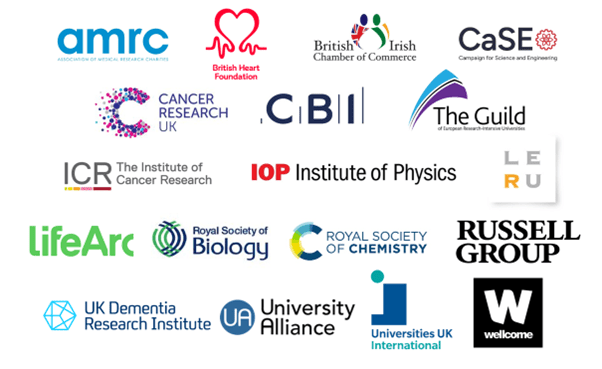Following the agreement in principle reached by the UK and EU regarding the Windsor Framework, representatives of the UK, Irish and wider European research, innovation and business communities have signed a joint statement urging rapid progress on UK association to EU programmes, including Horizon Europe, Copernicus and Euratom.
R&D Sector urges rapid progress on UK association to EU programmes
01 Mar 2023
R&D Sector urges rapid progress on UK association to EU programmes
As representatives of the UK, Irish and wider European research, innovation and business communities, we were heartened to hear the EU Commission President’s emphatic support for UK association to Horizon Europe. Both sides must now put renewed efforts into constructive dialogue to get association swiftly over the line, finally ending the damaging impasse that has lasted over two years.
Securing the UK’s place in EU programmes is crucial for shoring up the future of world-leading research, sustainable growth and high-level skills. Failure to do so now will be a second-best outcome for both the UK and the EU, undermining our collective efforts to tackle the big challenges of our time.
We are unequivocal that full UK membership of EU programmes, including Horizon Europe, Copernicus and Euratom, remains the best outcome for research and innovation. This has been the UK’s clearly stated position for a long time, and it is critical that the Government does not lose sight of the prize now that it is in reach. Now this important milestone has been reached, the EU must engage fully in technical discussions to ensure association can happen as soon as possible.
Delays to association have been mitigated in the short-term by the UKRI Horizon Europe Guarantee, and UK-based researchers continue to be successful at winning EU funding. The Guarantee and other measures have kept the window for association open while talks continue.
As we look to the future, the UK, the EU and communities worldwide face the same big challenges, from climate change, cancer and mental illness. By securing ongoing research collaboration through Horizon Europe, the UK Government and the European Commission will stack the odds in our collective favour for meeting these challenges. We urge that political will and commitment endures and look forward to seeing UK association become a reality.
Signatories
- Association of Medical Research Charities (AMRC)
- British Heart Foundation (BHF)
- British Irish Chamber of Commerce (BICC)
- Campaign for Science and Engineering (CaSE)
- Cancer Research UK (CRUK)
- Confederation of British Industry (CBI)
- The Guild of European Research-Intensive Universities
- The Institute of Cancer Research (ICR)
- Institute of Physics (IOP)
- League of European Research Universities (LERU)
- LifeArc
- Royal Society of Biology (RSB)
- Royal Society of Chemistry (RSC)
- Russell Group
- UK Dementia Research Institute (UKDRI)
- University Alliance
- Universities UK International (UUKi)
- Wellcome

Quotes
Dr Tim Bradshaw, Chief Executive of the Russell Group, said:
“The deal between the UK and EU on Northern Ireland removes the major barrier to UK participation in EU programmes, including Horizon Europe, Copernicus and Euratom. Now is the time for politicians on both sides to take decisive action to get association over the line, ending two years of damaging uncertainty and unlocking enormous benefits to scientists and researchers on both sides of the channel.
“Even after a delayed start, full participation in EU programmes, which can sit alongside important new schemes for global research partnerships, remains the best outcome for UK research and innovation. As well as making our science superpower ambitions more tangible, being in these programmes is a big win for individuals, businesses and the public more widely who will benefit from research that leads to medical breakthroughs, new technologies and other advances in knowledge. It would be a win-win for the UK and EU at a time when cooperation with our partners in Europe and beyond is more vital than ever to tackle shared global challenges like energy security and net zero.”
Dr Daniel Rathbone, Assistant Director, Campaign for Science and Engineering (CaSE):
“It was great to hear President von der Leyen say this week that the Northern Ireland Protocol agreement is ‘good news for scientists and researchers across the UK and EU’ and that work can start on association immediately, once the NIP deal is implemented.
“Negotiators should now press to associate the UK to Horizon Europe as soon as possible. This new Northern Ireland deal took about 4 months to negotiate, so we are optimistic any outstanding Horizon issues can be resolved much quicker especially with renewed goodwill on both sides. “UK and EU scientists are ready to go with collaborations and projects that will be of great benefit to people and businesses across the UK and Europe.”
Catriona Manville, Director of Research Policy at the Association of Medical Research Charities, said:
“The announcement of the Windsor framework opens the door to full UK membership of EU programmes, which would end two years of uncertainty for the UK research sector. These programmes are vital in breaking down barriers to international collaborations that are crucial for researchers to deliver maximum benefits to patients and society.
“We look forward to working with medical research charities and the Government to secure the UK’s place in these vital EU programmes and deliver a stable and sustainable research environment.”
Dr Owen Jackson, Director of Policy at Cancer Research UK, said:
“Horizon Europe association is overwhelmingly in the best interests of cancer researchers and patients globally. UK cancer scientists are in a strong position to win funding from Horizon Europe and the EU’s Cancer Mission, but we need to get association over the line to be at the centre of these important opportunities.
“We welcome the positive intent from the President of the European Commission to begin immediately on an association agreement. However, it is clear that this may take some time. Researchers have been left in limbo for far too long.
“The UK and EU must now work intensively to unlock association to Horizon Europe and end the delays that have frustrated scientists and damaged the UK’s international scientific reputation. Time is of the essence.”
Naomi Weir, Director Innovation Programme at the CBI, said:
“Horizon Europe enables unique international collaborative opportunities, raises the quality of UK and EU research and innovation, and gives UK businesses and universities a voice shaping the international research agenda. UK association to Horizon Europe has therefore long been recognised by businesses as a win-win for the UK and EU. The breakthrough in discussions over Northern Ireland now delivers a significant opportunity to get association over the line, which will accelerate delivery on UK science superpower ambitions.”
Tom Grinyer, Chief Executive of the Institute of Physics, said:
“Now that a Northern Ireland deal has been reached, the Institute of Physics believes the government must honour its commitment to UK science and innovation and associate to Horizon Europe as soon as possible.
“Being frozen out of Horizon Europe – the world’s largest research and innovation funding programme – has been costly to UK and European science and the physics innovations that can transform our society and economy; from green technologies to superspeed quantum computing. We can only reach physics’ full potential with the kind of thriving international partnerships and continuity that Horizon Europe can offer. The sooner we negotiate access to Horizon, the better for Britain’s economy, productivity and science superpower ambitions.”
Dr Mark Downs, Chief Executive of the Royal Society of Biology, said:
“We were delighted to hear an explicit statement at the press conference that the door is now open for discussions on Horizon association. We seek clarity on the next steps as a matter of urgency.”
Dr Helen Pain CSci CChem FRSC, CEO of the Royal Society of Chemistry, said:
“Now that the political barriers have been removed, we urge the UK Government and EU Commission to secure the UK’s association to Horizon Europe as swiftly as possible, to enable fruitful chemical sciences collaborations and achieve the best outcome for research and innovation in the UK and in Europe.”
Professor Bart De Strooper, Director of the UK Dementia Research Institute, said:
“To solve the biggest global problems – including major diseases like dementia – we need global scientific collaboration. As the UK’s leading biomedical research institute dedicated to neurodegeneration, we are unequivocal that the UK’s association to Horizon is our best hope for breakthroughs.
“This deal could not come soon enough for UK science. Uncertainty around our participation in Horizon has been harming progress for too long, as we saw only last week with the sacrifice of £1.6bn of research funding back to the Treasury. With the political roadblock finally removed, we look forward to an era of renewed international collaboration to drive scientific progress.”
Vanessa Wilson, CEO of University Alliance said:
“University Alliance, our member universities and the research community across the UK and EU have been unequivocal in our view that the UK’s association to Horizon Europe is the best and only outcome for the UK and the EU. The reasons for this are well rehearsed and well understood by decision-makers in Whitehall and Brussels.
“With the Windsor Framework announced this week, there can now be no further delay in securing UK association to Horizon Europe. It is time to give researchers across the UK and EU the certainty that they have been missing for some years now and allow them to focus on the important work of delivering research solutions to solve global challenges.”
Jan Palmowski, Secretary-General of The Guild of European Research-Intensive Universities, said:
“Now is the time for researchers to overcome any hesitations they might have had to develop Horizon-funded applications. And if UK colleagues had given up hope to apply for funding from the ERC and MSCA – now is the time to re-engage. We must now all act, with immediate effect, to ensure we make a success of UK Association so that the added value of UK-EU science collaboration can never be undermined again. And politicians must do their bit to bring UK association over the line, and ensure we can collaborate right across the programme.”
Prof. Kurt Deketelaere, Secretary-General of League of European Research Universities (LERU), said:
“On a daily basis, we experience in the LERU network that research and research collaboration know no borders. The UK has some of the most prominent research-intensive universities in the world (of which five are LERU members), and their association to Horizon Europe will be of immense value. We strongly urge the European Union institutions and the UK government to finally make this happen now that a major obstacle has been removed. Continuing close collaborations and tackling the many societal challenges in the framework of Horizon Europe are for the benefit of every European citizens’ wellbeing and prosperity. And, finally, let’s now realise the same for Switzerland !”
Related press

CaSE’s initial response to Spending Review 2025 following the Chancellor’s speech and the publication of the supporting documents.

The weekend before the UK Government’s 2025 Spending Review, the Department of Science Innovation and Technology (DSIT) announced the headline R&D spending plans for the next four years.

DSIT have today announced the criteria that will be used by government to set ten-year R&D budgets. We welcome this positive step towards a long-term sustainable policy platform that allows the UK R&D sector to thrive.

On Monday 12th May 2025 the UK Government published an Immigration White Paper titled Restoring control over the immigration system. Here is CaSE’s initial response to the publication.